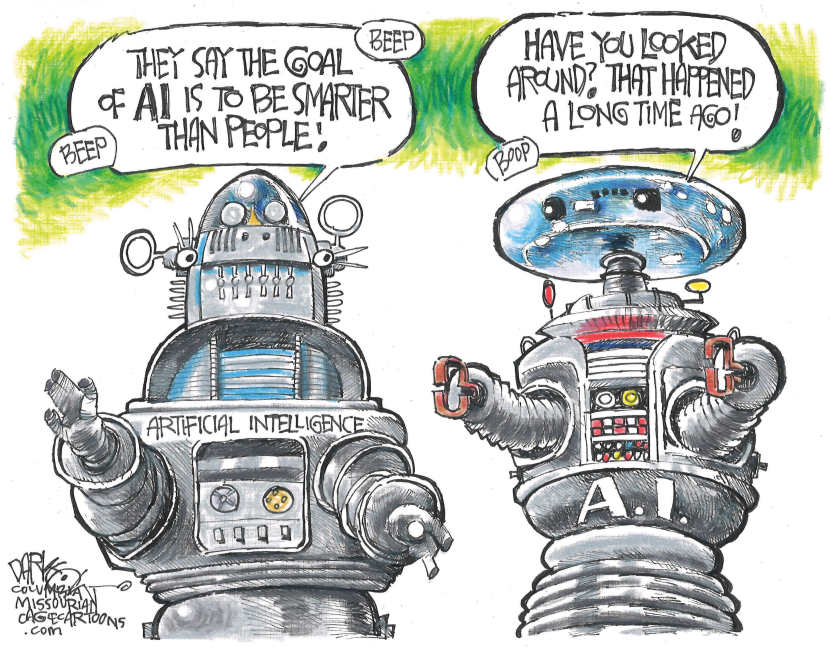
Here are some of the posts that caught my eye recently. Hope you find something interesting.
Lighter Links:
Trading Links:

Here are some of the posts that caught my eye recently. Hope you find something interesting.
Lighter Links:
Trading Links:
Posted at 10:54 PM | Permalink | Comments (0)
The World seems very “Us” versus “Them”... But are we really that different?
The six largest religions in the world are Christianity, Islam, Judaism, Hinduism, Buddhism, and Sikhism.
If you stripped away doctrine, what patterns might emerge in the world’s great sacred texts?
Similarity in Diversity.
We often think about the differences between religions. However, a deep review of their sacred texts shows striking similarities (and may be indications of a more integral “truth”).
Below is a word cloud for each of those religions based on their primary religious text. A word cloud is a visual map of language where the size and boldness of a word reflect its frequency in the text. In this case, the image spotlights the most frequent words across different religious texts (e.g., Jewish Bible, Christian New Testament, Quran, Hindu Vedas, Buddhist Tripitaka, Sikh Guru Granth Sahib).
Each panel highlights high-frequency terms like Lord, God, man, people, Israel, Indra, Agni, Allah, fortunate, Guru, etc., with the most frequently used words appearing larger and bolder. A visualization, like this, makes it easy to identify the recurring themes or focal points of each tradition.
So, here is a closer look at what a word cloud of the world’s religions reveals if we strip away doctrine and focus only on frequency.
teddyterminal via Reddit
On one level, this post explores both the similarities and limits of religious texts via word clouds.
As historian Yuval Harari notes, “Humans think in terms of stories, not statistics.” Those word clouds are the beginnings of narratives that go beyond the numbers. For example, shared words don’t mean shared values. The word ‘love’ in one tradition may imply obedience, while in another it means self-transcendence.
The Power and Pitfalls of Translation
Likewise, translating sacred texts into English makes them more accessible, but can distort meaning and nuance. As an illustration, if you noticed the name “Keith” at the bottom of the Hinduism word cloud, it’s because that was the translator’s name. You might also have seen the word “car” in the Hinduism cloud, that is not an anachronism or prophecy... it is just another old-fashioned word for “chariot”.
It’s also worth acknowledging that this word cloud is from the English translations, so some words that may mean slightly different things in other languages can be all translated to one word in English. For example, it’s very common in Biblical Hebrew to see different words translated into the same English word. Examples include Khata, Avon, and Pesha – three different “ways of committing a wrong” that may all be translated to the same English word.
Distortions like these occur across many texts and cultures. In other words, similarities in word usage do not always reflect shared values. Recognizing this helps us navigate between the boundaries of certainty and uncertainty.
This brings to mind an ancient parable …
The Parable of Perspectives – Lessons from the Elephant
I’ve always loved the parable of the blind men and the elephant. While there are many versions, here’s broadly how it goes:
A group of blind men heard that a strange animal, called an elephant, had been brought to the town, but none of them were aware of its shape and form. Out of curiosity, they said: "We must inspect and know it by touch, of which we are capable". So, they sought it out, and when they found it they groped about it. The first person, whose hand landed on the trunk, said, "This being is like a thick snake". For another one whose hand reached its ear, it seemed like a kind of fan. As for another person, whose hand was upon its leg, said, the elephant is a pillar like a tree-trunk. The blind man who placed his hand upon its side said the elephant, "is a wall". Another who felt its tail, described it as a rope. The last felt its tusk, stating the elephant is that which is hard, smooth and like a spear.
This parable highlights that even when everyone is “blind” to the whole truth, each perspective still holds real insight. Recognizing that partial views are still valuable can drive innovative, integrative thinking.
The blind men and the elephant parable also reminds us of the limitations of individual perspectives and the value of integrating multiple viewpoints. Interestingly, that integration is one of the things large language models are best at ... and helping humans access a perspective of perspectives might be a step towards enlightenment.
Future societies may see it as obvious that synthesizing perspectives (religious, cultural, strategic) can be done by advanced AI at scale, transforming how we resolve complex disputes.
Hope that helps.
Oh, and as a thought experiment ... What would the word cloud of your own guiding beliefs look like?
Posted at 05:18 PM in Art, Books, Business, Current Affairs, Gadgets, Ideas, Just for Fun, Personal Development, Religion, Science, Trading Tools, Web/Tech | Permalink | Comments (0)
I have a poster hanging in my office that says: “Artificial Intelligence is cool ... Artificial Stupidity is scary.”
The point is that we like the idea of automation and real-time decision-making, but only if the answers are correct.
Speed amplifies truth and error. AI makes you smarter faster—or wrong at scale. Sometimes, the systems we build to make better decisions also multiply our mistakes. Several core tensions create that paradox.
The problem isn’t just with automation. I’ve come to understand that an answer is not always THE answer. Consequently, part of a robust decision-making process is to figure out different ways of coming up with an answer ... and then figuring out which of those serves your purposes best.
That distinction is essential in automation and designing agentic processes, but it’s also important to think about that as we operate on a day-to-day basis.
That’s the point of today’s post. It’s about some of the common logical errors that prevent us from getting better results.
Several times this week, I used a simple framework that says if the outcome isn’t right, start by looking at the people, the process, and the information. Meaning, when troubleshooting outcomes, investigate whether you are using the right resource, the best method, and whether you have enough complete and accurate information to make an informed decision.
With that in mind, here is a quick primer on logical fallacies.
A logical fallacy is a flaw in reasoning. In other words, logical fallacies are like tricks or illusions of thought. As you might suspect, politicians and the media often rely on them. Recently, we discussed the Dunning-Kruger Effect ... but that’s just the tip of the iceberg.
Oxford Learning via InFact with Brian Dunning (Part 2, Part 3)
It is fun to identify which of these certain people (including yourself) use when arguing, deciding, or otherwise pontificating. To help, here is a short list of TWENTY LOGICAL FALLACIES:
They fall into three main types: Distraction (10), Ambiguity (5), and Form (5).
A. Fallacies of Distraction
1. Ad baculum (Veiled threat): "to the stick":
DEF.- threatening an opponent if they don’t agree with you; EX.- "If you don’t agree with me you’ll get hurt!"
2. Ad hominem (Name-calling; Poisoning the well): "to the man":
DEF.- attacking a person’s habits, personality, morality or character; EX.- "His argument must be false because he swears and has bad breath."
3. Ad ignorantium (Appeal to ignorance):
DEF.- arguing that if something hasn’t been proved false, then it must be true; EX.- "U.F.Os must exist, because no one can prove that they don’t."
4. Ad populum: "To the people; To the masses":
DEF.- appealing to emotions and/or prejudices; EX.- "Everyone else thinks so, so it must be true."
5. Bulverism: (C.S. Lewis’ imaginary character, Ezekiel Bulver)
DEF.- attacking a person’s identity/race/gender/religion; EX.- "You think that because you’re a (man/woman/Black/White/Catholic/Baptist, etc.)"
6. Chronological Snobbery
DEF.- appealing to the age of something as proof of its truth or validity; EX.-"Voodoo magic must work because it’s such an old practice;" "Super-Glue must be a good product because it’s so new."
7. Ipse dixit: "He said it himself":
DEF.- appealing to an illegitimate authority; EX.- "It must be true, because (so and so) said so."
8. Red Herring (Changing the subject):
DEF.- diverting attention; changing the subject to avoid the point of the argument; EX.- "I can’t be guilty of cheating. Look how many people like me!"
9. Straw Man:
DEF.- setting up a false image of the opponent's argument; exaggerating or simplifying the argument and refuting that weakened form of the argument; EX.- "Einstein's theory must be false! It makes everything relative--even truth!"
10. Tu quoque: "You also"
DEF.- defending yourself by attacking the opponent; EX.- "Who are you to condemn me! You do it too!"
B. Fallacies of Ambiguity
1. Accent:
DEF.- confusing the argument by changing the emphasis in the sentence; EX.- "YOU shouldn’t steal" (but it’s okay if SOMEONE ELSE does); "You shouldn’t STEAL" (but it’s okay to LIE once in a while); "You SHOULDN’T steal (but sometimes you HAVE TO) ."
2. Amphiboly: [Greek: "to throw both ways"]
DEF.- confusing an argument by the grammar of the sentence; EX.- "Croesus, you will destroy a great kingdom!" (your own!)
3. Composition:
DEF.- assuming that what is true of the parts must be true of the whole; EX.- "Chlorine is a poison; sodium is a poison; so NaCl must be a poison too;" "Micro-evolution is true [change within species]; so macro-evolution must be true too [change between species]."
4. Division:
DEF.- assuming that what is true of whole must be true of the parts; EX.- "The Lakers are a great team, so every player must be great too."
5. Equivocation:
DEF.- confusing the argument by using words with more than one definition; EX.- "You are really hot on the computer, so you’d better go cool off."
C. Fallacies of Form
1. Apriorism (Hasty generalization):
DEF.- leaping from one experience to a general conclusion; EX.- "Willy was rude to me. Boys are so mean!"
2. Complex question (Loaded question):
DEF.- framing the question so as to force a single answer; EX.- "Have you stopped beating your wife yet?"
3. Either/or (False dilemma):
DEF.- limiting the possible answers to only two; oversimplification; EX.- "If you think that, you must be either stupid or half-asleep."
4. Petitio principii (Begging the question; Circular reasoning):
DEF.- assuming what must be proven; EX.- "Rock music is better than classical music because classical music is not as good."
5. Post hoc ergo propter hoc (False cause): "after this, therefore because of this;"
DEF.- assuming that a temporal sequence proves a causal relationship; EX.- "I saw a great movie before my test; that must be why I did so well."
For more on that, here is a fun and informative infographic by The School of Thought.
We must use logic as a spam filter: Fallacies are the junk mail of thought—fast, flashy, and costly when clicked.
Hope that helps.
Posted at 10:39 PM in Business, Current Affairs, Ideas, Just for Fun, Personal Development, Religion, Science, Trading, Writing | Permalink | Comments (0)

Here are some of the posts that caught my eye recently. Hope you find something interesting.
Lighter Links:
Trading Links:
Posted at 10:19 PM | Permalink | Comments (0)
I don’t usually write about individual companies, but an infographic highlighting BlackRock’s impressive growth caught my eye.
BlackRock has been around since 1988. It wasn’t until the early 2000s that it really took off, but since then, they’ve clearly been doing something right.
Now, they are the world’s largest asset manager.

Voronoi via visualcapitalist
In 2006, BlackRock acquired Merrill Lynch Investment Managers, nearly doubling its AUM, but its CAGR shows that it’s not just luck that has helped BlackRock achieve its current position.
In 2023, when I reviewed their equity holdings, they held approximately $9 trillion in assets. Now that has grown to more than $12 trillion.
While they aren’t as transparent as Berkshire Hathaway about what they do or how they do it, according to its website, BlackRock positions itself as a systematic investor that leverages vast datasets and new technologies.
Comparing again to Berkshire Hathaway, both have invested heavily in Apple, which isn’t particularly surprising.
While I enjoy insights into other investors' playbooks, it’s not the be-all and end-all. It’s simply one way to invest ... and might be a reasonable way to get from a lot of money to even more money - but their trading strategy isn’t necessarily going to work for the average investor (or you).
Still, when there is blood in the streets … asking, “What would Warren or Blackrock do?” might be a great place to start.
However, it is challenging to maintain an edge if you use the same process and data as your competitors (especially when they have enough assets to use time or trade size to their advantage).
As the flywheels of commerce spin faster, edges will emerge and decay faster than ever before. Finding a solution is only a step in an ongoing process.
Robust, reliable, and repeatable innovation at scale is a meaningful competitive advantage. That implies that idea factories will become as important (if not more so) than factories that produce material products. Likewise, innovation funnels will become more important than sales funnels.
The world changes at the speed of thought ... and as technology continues to improve ... even faster.
Thankfully, we live in interesting times.
Posted at 07:38 PM in Business, Current Affairs, Ideas, Market Commentary, Trading, Trading Tools, Web/Tech | Permalink | Comments (0)

Here are some of the posts that caught my eye recently. Hope you find something interesting.
Lighter Links:
Trading Links:
Posted at 07:32 PM | Permalink | Comments (0)
A few weeks ago, we discussed the changes in the job market since 1988, but the focus was primarily on the most common jobs.
Now, let’s take a look at which industries are struggling to find qualified candidates or to keep them.
As AI becomes more prevalent, it’s essential to consider several key factors when thinking about jobs and the future of work.
One thing to consider is whether an industry is ripe for disruption ... or just replacement. Another consideration is whether a role can be easily automated.
To start, try to understand which industries are currently seeking job candidates and have long-term stability. Here is a chart from VisualCapitalist showing global employers expecting challenges hiring talent.
Voronoi via visualcapitalist
Labor shortages are increasing globally, and yet many young adults are struggling to find careers.
This chart helps us understand where skilled workers are needed and which industries may be struggling.
Real estate tops the list with 60% anticipating hiring difficulties in the near term. With high interest rates and market volatility, it does make sense. People tend to look for easy wins, and volatility scares both investors and employees alike.
While we know that retail & fast food workers are still among the most common jobs, hospitality has been struggling. This could be caused by labor conditions and complaints about compensation.
Meanwhile, tech, healthcare, and telecom are the least affected by job insecurity. While these are saturated markets, they’re also growing markets with well-defined career paths and consistent demand.
Posted at 04:38 PM in Business, Current Affairs, Healthy Lifestyle, Ideas, Market Commentary, Personal Development, Science, Trading, Web/Tech | Permalink | Comments (0)
Seemingly complex things are often simpler when understood.
This applies to many things.
For example, great writing is diverse and nuanced ... but its underlying structure often isn't.
Kurt Vonnegut wrote several "Classics", including Cat's Cradle, Slaughterhouse-Five, and The Sirens of Titan.
Despite his great writing and its complexities, he was able to simplify his stories into a few basic narrative shapes.
Here is a graphic that explains the concept.
Here is a 17-minute video of Vonnegut discussing his theory of the Shape of Stories. You can grasp the basic concepts within the first 7 minutes, but he is witty, and the whole video is worth watching.
You can explore a bit more elaborate version of his "Shapes of Stories" idea in Vonnegut's rejected Master's thesis from the University of Chicago.
Researchers recently extended Vonnegut's idea by using AI to extract the emotional trajectories of 1,327 stories and discover six core emotional arcs. In case you are curious, here they are.
For more on writing from Kurt Vonnegut:
My friend, John Raymonds, also has a substack. He just released a great article on the power of storytelling. It dives deep into the nature of stories and narrative transportation. Check it out.
Have a nice week.
Posted at 08:01 PM in Art, Books, Current Affairs, Film, Ideas, Just for Fun, Movies, Science, Television, Web/Tech, Writing | Permalink | Comments (0)

Here are some of the posts that caught my eye recently. Hope you find something interesting.
Lighter Links:
Trading Links:
Posted at 07:59 PM | Permalink | Comments (0)
The Growth of U.S. Businesses Over the Last 5 Years ...
Business creation has grown almost 20% over the last five years, with small businesses generating about 60% of new jobs in America. However, a look at the data shows a small number of firms drive most of that growth.
According to J.P. Morgan, the information sector posted the strongest five‑year growth gains (+58%), followed by professional and business services (+32%) and education and health services (+25%).
It’s not surprising that the information business grew fastest, given the catalyst that AI and automation offer, and the growing awareness that data is increasingly a valuable asset.
AI today reminds me a lot of the Internet boom in the early 2000s. Back then, everyone focused on the technology, and it seemed like a separate tech domain. But now, almost every company relies on that technology as infrastructure, making it part of the playing field. I believe AI will become so widespread that, for most businesses, it will simply be part of the landscape.
For example, AI and healthcare are a natural pair with transformative potential. By making diagnostic procedures faster, predicting patient outcomes, and customizing treatment plans, AI is poised to revolutionize how we treat or cure diseases and also how we improve longevity and regenerative medicine results. Interest and assets are sure to flow into that sector.
However, no matter where you look, the growing capabilities and tech infrastructure have profound implications for growth and transformation.
I’m curious which sectors you expect to grow fastest going forward?
As always ... Onwards!
Posted at 02:48 PM in Business, Current Affairs, Ideas, Market Commentary, Science, Trading, Web/Tech | Permalink | Comments (0)
Reblog (0)